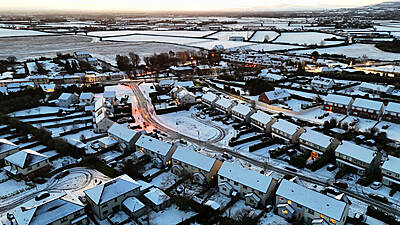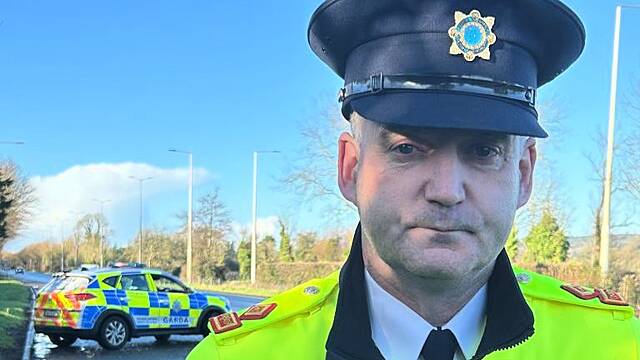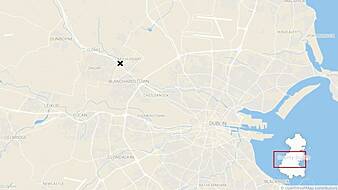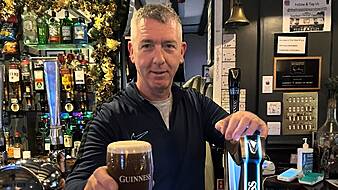Gardaí said 17 people had died on Irish roads since before Christmas, and issued a road safety warning as temperatures were forecast to plummet to minus eight degrees Celsius overnight.
A total of 174 people were killed in road collisions in 2024, including 15 persons in December. The first week of 2025 has seen two people killed on the roads.
Superintendent Liam Geraghty, Garda Press Officers told reporters that despite repeated warnings, motorists were continuing to speed, drive under the influence of alcohol and narcotics, and use mobile phones while driving.
More than 13,000 drivers were detected for speeding offences between November 29th and January 6th, with the highest speed, 213km/hr in a 100km/hr, detected on the N7 at Brownsbarn, Co Dublin.
Several motorists were found traveling more than twice the maximum speed limit in built up areas with speed limits of 50km/hr.
“These speeds are life-threatening, not just to the drivers and passengers of these vehicles, but to other road users, particularly in our lower speed zones,” Supt Geraghty told reporters on the R445 between Limerick City and Bunratty, Co Clare.
“It is disrespectful and dangerous for drivers to be carrying out speeds of those levels on our roads, despite all the warnings and public safety messaging that is taking place,” he said.
A total of 939 people were arrested on suspicion of driving under the influence of an intoxicant during the five and half week Garda road safety campaign that ran through November 29th to January 6th.
Superintendent Geraghty said it was a “concern” that “drug-related” driving had increased “and accounts for about one-in-three/one third of those (939) arrests”.
There were 85 major collisions for the same period resulting in persons sustaining serious and life threatening injuries.
Supt Geragthy warned motorists to “slow down” and not make unnecessary journeys as temperatures were forecasted to drop to minus eight degrees Celsius overnight.
“A reduction of 5km/hr in our average speeds will reduce fatal road traffic collision by 30%, we can make a change in our behaviour on our roads,” explained Supt Geraghty.
“We’ve seen extremely adverse road conditions right across the southwest of the country, particularly in Kerry, Cork, west Limerick, west, and south Tipperary into Kilkenny, it’s very obvious in these areas that there is poor and adverse road conditions,” he warned.
“Don’t be complacent on the roads tonight and into Thursday - even though you may not see snow on the ground, the extreme cold weather is going to make driving conditions extremely hazardous right across the country, with severe risk for black ice, and freezing fog.”
Gardaí said they seized 2,636 vehicles/70 vehicles per day, involved in road traffic offences, the majority of which were for drivers having no insurance and Learner Drivers driving unaccompanied, during the pre-Christmas/New Year road safety campaign.
In addition, Garda said they issued 1,311 fixed charge notifies to motorists for using a mobile phone while driving.
Senior forecaster with Met Éireann Gerry Murphy has warned that conditions on roads are going to be treacherous in the coming days.
Temperatures in some parts of the country will not rise above zero degrees Celsius on Wednesday and Thursday, he told RTÉ radio’s News at One.
Wednesday night will be even colder than Tuesday night, he added. There is likely to be a Yellow Alert in place until 6 am on Friday with a possibility of an Orange Alert for some counties for Thursday night.
“The broad message is that it's going to be extremely cold, severe frosts, ice, lying snow, and then added into that as the winds decrease and some fog of freezing fog as well, which would all mean for very poor conditions for traveling.”
Mr Murphy explained that a Yellow warning is for temperatures as low as minus five degrees, while an Orange alert is when temperatures go down to minus nine degrees. If it goes below minus 10 degrees then it will be a Red alert.
“Broadly across many counties tonight, we can expect those temperatures to drop to between minus five and about minus eight, minus nine. Perhaps one or two places will go lower. But broadly, as low as minus eight is what we expect tonight over a large number of counties. And that has a major impact due to the frost, but also then on people as well.
"These are very, very low temperatures. So great care needs to be taken of people with regard to vulnerable people and homeless people and also all areas of communities really where temperatures may affect people and indeed animal welfare as well.”

Paul Crone of the National Association of Principals and Deputy Principals has told RTÉ that the majority of schools are operating as normal, but will continue to monitor the weather warnings and conduct a risk assessment in the morning.
Schools have been dealing with no power and no water and they are also liaising with local authorities about when such services will resume, he said. Some are also dealing with heavy snowfall on school premises and “refreezing” on top of that.
“Others are dealing with school transport not operating or if they're on a back road in the rural area, the road to the school is unsafe to access. So they're constantly monitoring that to tell if the situation is changing.
"Many schools will be trying to get local contractors to maybe scrape the yard and the school or the access to the school to try and remove falling snow, spreading salt to try and make sure that they can make the schools safe to open. And a lot of them are having success in that and some of them are not having success with that.”







